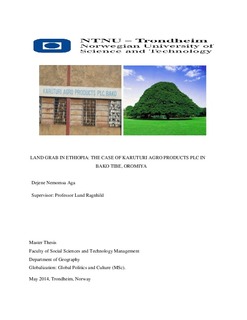| dc.description.abstract | This study examined the opportunities and risks associated with land grabbing in Ethiopia, focusing on the case of Karuturi Agro Products Private Limited Company in Bako Tibe of Oromiya National Regional State, using qualitative analysis.
Forty local farmers affected by agricultural investment expansion owned by Karuturi were randomly selected from Bako Tibe Kebele (Bacarraa Odaa Gibee) adjacent to the investment, and placed in to five groups each consisting of eight members for Focus Group Discussion. An interview guide was prepared and key informant interviews with Bako Tibe woreda, West Shawa zone and Oromiya National Regional State and Federal Government officials were conducted to collect relevant data. Frequent use of observation of the research site and the surrounding area accommodated data collected through FGD and semi-structured interview. Available official documents, including the country’s constitution and several proclamations, were collected from different government organs and used in the research where appropriate.
The study investigated the issue of land grabbing from the process of land acquisition by a foreign company to the outcomes after land expropriation took place in the study area. Local communities lost their communal land, which used to serve for grazing purposes and cultivation of agricultural products for some displaced local farmers. Private property of local famers was transferred to Karuturi Agro Products Plc for a period of forty five years starting from 2008. Natural forests were cleared, rivers were contaminated by waste chemicals, and biodiversity was lost as a result of slash and burn by the company. Local communities used sharecropping, change of occupation and land use change as a strategy to sustain their livelihood.
Government’s intension was to bring about a productive land use system with modern agricultural technology and employment creation for the local people including improvement of local facilities and expansion of infrastructures. But, these expected development opportunities for local people and the country were not fulfilled because of the company’s low productivity of agricultural outputs as compared to local farmers and failure of the company to fulfill what is agreed during the contractual agreement with the government. | nb_NO |
